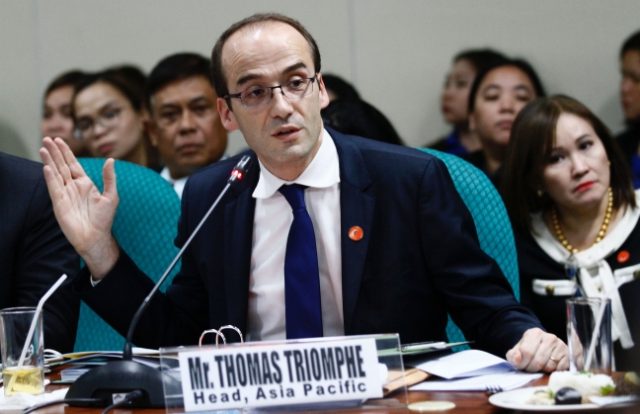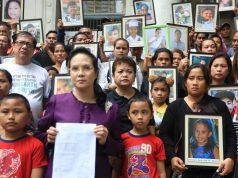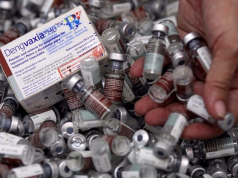
Sanofi Pasteur has taken great pains to persuade the public that Dengvaxia is “good, safe, and effective” even following its disclosure two weeks ago that persons who have never had dengue and were vaccinated could have severe dengue once infected with the virus.
At the Senate Blue Ribbon Committee hearing on Monday, Sanofi Pasteur Asia-Pacific head Thomas Triomphe maintained that the vaccine is “safe and efficacious” even as Senate Committee chairperson Senator Richard Gordon recited a list of incidents where Sanofi Pasteur personnel bribed doctors in various countries.
Gordon also berated Triomphe for continuing to advertise the vaccine previously even as the Senate was investigating the drug, which the lawmaker felt was an insult to him.
Triomphe maintained that Dengvaxia offers protection against dengue, and is “undeniably” beneficial to the Philippines given that it has one of the higher endemicity of the disease in the world. The drug was the product of rigorous research and development, involving more than 40,000 people from 15 countries.
It is now being used in 11 countries in public and private markets, and is registered in 19 countries even as it is being reviewed by “many other countries” for licensure.
“(There is) not one single death causally linked to the vaccine,” Triomphe said.
He also pointed out that even after they revealed their latest findings, in all other countries where Dengvaxia is licensed, its use has been continued. He hoped the fact that other countries continue to use it will assure Filipinos that the vaccine is safe.
Triomphe also articulated on the disclosure: Those who hadn’t been infected by dengue before have a 0.2 percent increased risk of getting what Sanofi Pasteur calls “severe dengue” cases, but which in the Philippines corresponds to “traditional dengue” symptoms such as fever, low platelet count, and nose or gum bleeding.
He added that Dengvaxia has a sustained and longer protective effect on so-called seropositive persons (those who had been infected with dengue prior to getting vaccinated), which, according to him, constitutes an estimated 90 percent of the population in the Philippines. With the vaccine, the greater majority of the Filipino people will be protected for almost six years, he said.
In the country, dengue is not just a risk but a reality. It is not isolated, but everywhere, Triomphe said. To permanently remove Dengvaxia from the market will mean regression in the country’s efforts in solving a major public concern. This will leave 90 percent of the population at the mercy of an epidemic which is preventable, he warned.
Asked by Senator Risa Hontiveros if Sanofi Pasteur is willing to shoulder the costs to parents whose children may have been exposed to unnecessary risk due to some fault or inadequacy on the part of the company, as a token of good will, Triomphe replied, “We have not seen any default or any negligence on the part of the company, but of course we keep monitoring our product. Each time we see any adverse events, we communicate, we’ll keep working for any such thing as an adverse event.”
He continued, “For example, we have processes in place for every single product in every single country where every single case of adverse event is monitored, checked, validated by doctors, there is an official report being produced, and then we work with the company to see what is the causality of the adverse event. All these processes of course will be implemented for this product as they are for all our products in the world.”
He added that the Department of Health has been Sanofi Pasteur’s partner in public immunization through the years, and the company is willing to collaborate on surveillance with the DOH.
As for the bribery allegations in other countries, Triomphe said Sanofi Pasteur had a zero-tolerance policy for bribery or any violations of the law, and when they find such a case, they immediately act with termination.
Meanwhile, Gordon said people had been asking him if they could file a class suit, to which he replied it was the prerogative of anybody who wants to do it.









